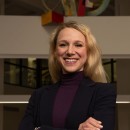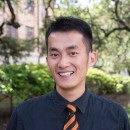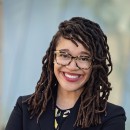School of Social Work News
Pages
 William Elliott Discusses New York City’s Child Savings Account Program
William Elliott Discusses New York City’s Child Savings Account ProgramProfessor William Elliott is quoted in a New York Times article about the effects of Child Savings Accounts. New York City has announced a pilot program in which a savings account with $100 will be opened for every public school kindergartener. Elliott describes how even these small amounts can significantly increase a child’s likelihood of going to college, in part by offering students and parents a sense of both possibility and control. “They feel like they can change their destiny and their future,” he said.
- October 14, 2021
- Learn more »
 Luke Shaefer Discusses Child Tax Credit with The New York Times
Luke Shaefer Discusses Child Tax Credit with The New York TimesProfessor Luke Shaefer discusses the child tax credits with The New York Times, “Of 4 Family Policies in Democrats’ Bill, Which Deserves Priority?” Shaefer argued: “The child tax credit is elegant in that it does something for all low- and middle-income families.” “It does the most to empower families to do what they think is best for their families.”
- October 14, 2021
- Learn more »
 William Elliott Argues for Poverty Alleviation Programs and Child Savings Accounts
William Elliott Argues for Poverty Alleviation Programs and Child Savings AccountsProfessor William Elliott’s opinion article in the Gotham Gazette argues that poor children and families need both poverty alleviation and child savings programs. Elliott writes, “I am arguing that the drive Americans have demonstrated throughout history comes from more than having enough money to pay the bills each week, it comes from the promise of a better future.”
- October 13, 2021
- Learn more »
- Terri Friedline’s Study Cited in NBC News Article on Postal Banking
Associate Professor Terri Friedline’s study is cited in an NBC News article about a U.S. Postal Service pilot program offering financial services, which could lead to a return in postal banking. Friedline’s study showed that 69% of U.S. census tracts with local post offices do not have community bank branches, making it difficult for residents to access financial services. The postal service offered banking services in local branches from 1911-1967.
- October 6, 2021
- Learn more »


 School of Social Work Researchers Lead New Program for Adolescent and Young Adult Cancer Patients
School of Social Work Researchers Lead New Program for Adolescent and Young Adult Cancer PatientsProfessor Brad Zebrack, PhD student Nina Jackson Levin and Assistant Professor Anao Zhang are researchers and leaders of the new Adolescent and Young Adult (AYA) Oncology program, which was recently established at C.S. Mott Children’s Hospital and the Rogel Cancer Center. They discuss the program, and why it’s important to have a program that addresses the unique needs of cancer patients of this age, with the U-M Lab Blog.
- October 4, 2021
- Learn more »
 William Elliott Contributes Essay on Building Wealth for New Aspen Institute Book
William Elliott Contributes Essay on Building Wealth for New Aspen Institute BookProfessor William Elliott’s essay is included in the new book “Future of Building Wealth: Brief Essays on the Best Ideas to Build Wealth - for Everyone” which was published by The Aspen Institute Financial Security Program in partnership with the Federal Reserve Bank of St. Louis. The book provides policymakers and financial leaders with the tools, resources and innovative ideas to pave the way for economic growth and prosperity for all American families.
- October 4, 2021
- Learn more »
- Alumni Honored with SSW Distinguished Alumni Awards
The Distinguished Alumni Award recognizes School of Social Work alumni whose achievements exemplify the values of the School of Social Work and who have made an exceptional impact on the profession, the community and/or Social Work education.
- September 29, 2021
- Shanna Kattari Discusses Physical and Economic Challenges of Managing a Disability
Shanna Kattari, “We need to realize that not all disabilities are the same, and we have different needs and require different accommodations”. Read the full story at WalletHub’s “2021's Best & Worst Cities for People with Disabilities” article.
- September 29, 2021
- Learn more »
 Ashley Cureton Received 2021 Diversity Recognition Award from the Johns Hopkins Diversity Leadership Council
Ashley Cureton Received 2021 Diversity Recognition Award from the Johns Hopkins Diversity Leadership CouncilAssistant Professor Ashley Cureton has received a 2021 Diversity Recognition Award from the Johns Hopkins Diversity Leadership Council. The award recognizes outstanding accomplishments of faculty, staff, students and alumni whose demonstrable efforts advance diversity and inclusion at Johns Hopkins University. “I am so honored to receive this award. My postdoc and lectureship at Johns Hopkins overlapped with the COVID-19 pandemic and a heightened awareness of the systemic racism and racial inequities in higher education and across the U.S., so I was adamant about developing effective strategies to create equitable outcomes for underrepresented populations by engaging in DEI initiatives. I hope to continue to engage in DEI work as a new faculty member at the University of Michigan.”
- September 29, 2021
- Learn more »
 Realm of the Dead - Using Art in Social Work Education and Practice
Realm of the Dead - Using Art in Social Work Education and PracticeEach piece of vintage luggage in the installation performance tells a piece of Rogério Pinto's story. Crafted into sculptures, suitcases and trunks recount a period when he was consumed by the loss of his three-year-old sister Marília and his family's struggles after her death.
Born and raised in Brazil, Pinto, a professor and associate dean for research and innovation at the University of Michigan School of Social Work, found a way through the visual and performing arts to confront a painful past, find peace and forgiveness. He created an award-winning play entitled "Marília," readapted now as a new art project called "Realm of the Dead."
This community-based art initiative invites the audience to dive into complex subjects from death and parental molestation to ethnicity, race, gender and other issues. It premieres in October at the U-M School of Social Work, which celebrates its centennial. "Realm of the Dead" is an autobiographical project that uses self-referential theater as a vehicle for self-healing and advocacy. Based on pedagogy and theater of the oppressed, it intends to advance social work research and practice, as tools of critical reflection, personal growth and advocacy.
- September 29, 2021
- Learn more »